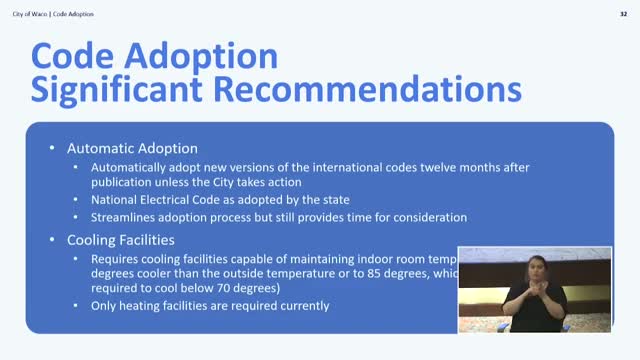City to update building codes, move Certificate of Occupancy rules and add cooling standard; EV appendix proposed as optional
Get AI-powered insights, summaries, and transcripts
Subscribe
Summary
Development services proposed moving Certificate of Occupancy rules into the building chapter, adopting current international and national electric codes on a rolling basis, adding a cooling requirement for hot weather, and recommending the EV appendix be optional when installed; plan commission recommended approval of the CO change.
City staff presented proposed updates to building and electrical codes, a revised Certificate of Occupancy (CO) procedure and local amendments to address cooling and electric‑vehicle (EV) infrastructure.
Director of Development Services Clint Peters told the council staff proposes to move CO provisions from Chapter 28 (zoning) into Chapter 6 (building regulations) to better align with construction permitting and inspections. The draft codifies multiple CO types — clean and show, shell, temporary occupancy tiers and change‑of‑use processes — and grants the building official limited authority to suspend or revoke COs in safety‑related circumstances. Peters said the plan commission recommended approval.
On statewide codes, staff proposed adopting the newest model codes on a three‑year cycle and adding an automatic adoption clause: new international and national electric codes would be adopted automatically 12 months after publication unless council takes action during that window. Peters called this a streamlining measure that preserves time for stakeholder review and local amendments.
Staff proposed a local cooling requirement to address hot Texas summers: occupied buildings would need a cooling capability equal to either 15 degrees below outdoor temperature or not exceeding 85 degrees indoor temperature, with a local cap preventing mechanical cooling below 70 degrees. Peters said the council’s advisory board considered the change and recommended it because the current codes require heating but not cooling.
On EV infrastructure, staff proposed adopting the EV appendix but making it optional (“may” instead of “shall”) so that where EV infrastructure is installed it must meet code standards without imposing a mandatory retrofit or requirement on all new single‑family development. Peters said advisory stakeholders debated the appendix and staff recommended the compromise language.
Next steps: staff will proceed with ordinance language for code adoption and return for readings as part of the scheduled code update process.
